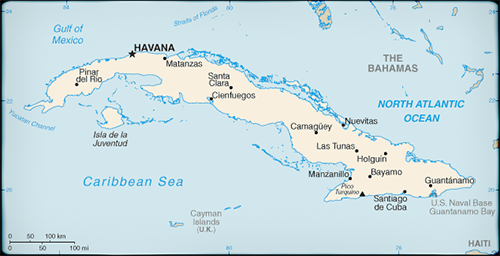The United States has provided "significant" funds to Costa Rica to provide accommodations for U.S.-bound Cuban illegal aliens waiting to be able to continue northward.
This was revealed by U.S. Ambassador Stafford Fitzgerald Haney in an interview earlier this month with the Costa Rican newspaper La Nacion on the transfer of those Cubans to Mexico.

Last November, approximately 8,000 Cuban migrants were stranded in Costa Rica after Nicaragua closed its border and refused to let the islanders pass through on their way north. After a series of negotiations, Costa Rica reached an agreement with El Salvador, Guatemala, Mexico, and the International Organization for Migration to enable the Cubans to reach the United States. They agreed to fly the Cubans (at the Cubans' own expense) out of Costa Rica to El Salvador and bus them through Guatemala to Mexico, where they would then continue to make their way to the U.S border. They then present themselves to U.S. authorities and receive automatic legal status (and full welfare eligibility) under the "wet-foot/dry-foot" policy of the Cuban Adjustment Act of 1966.
Since then, the agreement has been expanded to include direct flights from Costa Rica to Mexico's northern border with the U.S. Panama has arranged a similar deal with Mexico for the 1,000-plus Cuban migrants in its territory (who were stuck when Costa Rica closed its own border to them after Nicaragua's action).
It's not clear whether U.S. taxpayers are also supporting the Cubans in Panama while they wait their turn to fly to Mexico and then cross over to the United States.
Here are translated excerpts from the interview with Amb. Haney that relate specifically to U.S. involvement in the transfer of the Cubans from Costa Rica to Mexico, including the funds for their room and board while in Costa Rica:
What was the role of the US in these talks? Presumably, the United States, at least, was consulted on what was going to be done (given that it is the final destination of the migrants).
Not that much. I think we had always said that there are two aspects: migratory and humanitarian. And we here at the Embassy, we always focus on the humanitarian side to see if we could help Costa Rica to lead with the other countries, because we were concerned that it could not deal with 8,000 people who they did not expect.
As for the migratory flow, we are always in talks because we consider it important for the region. But as the agreement itself, that was something between countries. We participated in a meeting in December in Mexico, and we [pushed] for a few more requirements to be put on the visa for admission to the Cubans.
...
How would you define the role of the US Embassy during the weeks it took to resolve the migrants' departure? Did you speak much, or not, with Costa Rican authorities?
We talked a lot, the first weekend in particular. We have had constant contact throughout the crisis. We have been in contact from the beginning.
Has the Government of Costa Rica approached the US Embassy to ask for financial assistance to address the humanitarian crisis while the departure of all the Cuban migrants is completed?
The Government of Costa Rica made an international request through the International Organization for Migration (IOM). We as a country participated in this request through the organization. Through the State Department of Bureau of Population, Refugees, and Migration, we donated to the IOM, which is already coordinating with the Government of Costa Rica. Through the IOM we also want to help to see how we can strengthen the Costa Rican immigration system.
How much is the monetary contribution being made by the U.S. government for the attention of Cubans who have not yet left Costa Rica?
I would say it is significant.
So, while the Cuban illegal aliens themselves had to pay for their transportation to the Rio Grande, the U.S. government helped pay for their accommodations while in Costa Rica and then looked on as foreign nations worked together to complete their smuggling journey north. Then, once in the U.S., they are given immediate status under the obsolete Cuban Adjustment Act, including full access to welfare benefits.
